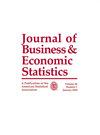国内生产总值(GDP)不是新兴经济体衡量和经济实力比较的合适指标——来自海外净要素收入国际分配的判断
IF 2.9
2区 数学
Q1 ECONOMICS
引用次数: 0
摘要
1990年至2019年期间,来自国外的净要素收入(NFI)的全球分布表明:(1)美国是最大的一个国家,占全球总盈余的40%,而中国的赤字随着GDP的增长而激增;(2)新兴经济体的GDP增长与NFI赤字之间存在价格剪刀关系;(3)不对称的NFI掩盖了富裕国家尤其是新兴经济体的全球套利的严重性;(4)中国的经济实力被世界银行以购买力平价计算的GDP夸大了。结论是:(1)发展中国家为其崛起付出了巨大的隐性成本;(2)美国遭受损失的说法绝对不成立;(3) GDP并不是衡量重要事物的通用工具。结果表明:(1)新兴经济体应警惕GDP对经济计量和经济实力比较的潜在误导;(2)从经济类型的适用性角度对GDP进行批判;(3)迫切需要澄清围绕全球价值链格局的经济事务中的一些误判和误导概念;(4)新兴经济体国家治理能力建设应以“社会基础设施”为重点,有效的经济统计体系是社会基础设施建设的重要组成部分;(5)新兴经济体应实施国际经济统计人才战略布局,提升自身软实力。本文章由计算机程序翻译,如有差异,请以英文原文为准。
Gross Domestic Products (GDP) is not a Proper Indicator of Measurement and Economic Power Comparison for Emerging Economies: A Judgement from International Distributions of Net Factor Income from Abroad
Global distributions of net factor income from abroad (NFI) during 1990-2019 have witnessed that (1) the United States is the top one country accounting for 40% of surpluses of the global total, while a surge in China’s deficit with its GDP increase; (2) GDP growth in emerging economies has a price scissors with NFI deficits; (3) asymmetric NFI has covered up the severity of rich countries’ global arbitrages especially from emerging economies; (4) China’s economic power is exaggerated by the PPP-based GDP implemented by the World Bank. It concludes that (1) developing countries have paid for huge hidden cost for their emergence; (2) the statement of the United States suffering losses absolutely does not hold; (3) GDP is not a universal tool for measuring what matters. It suggests that (1) emerging economies countries should beware of the potential misleading of GDP on economic measurement and economic power comparison ; (2) GDP should be critiqued from the applicability perspective of economies’ types; (3) it is urgent to clarify some misjudgment and misleading concepts in the economic affairs surrounding the global value chain patterns; (4) the construction of national governance capacity in emerging economies should focus on “social infrastructure”, of which one of the important parts is an effective economic statistics system; (5) emerging economies should carry out the strategic layout of international economic statistics talents to enhance their soft powers.
求助全文
通过发布文献求助,成功后即可免费获取论文全文。
去求助
来源期刊

Journal of Business & Economic Statistics
数学-统计学与概率论
CiteScore
5.00
自引率
6.70%
发文量
98
审稿时长
>12 weeks
期刊介绍:
The Journal of Business and Economic Statistics (JBES) publishes a range of articles, primarily applied statistical analyses of microeconomic, macroeconomic, forecasting, business, and finance related topics. More general papers in statistics, econometrics, computation, simulation, or graphics are also appropriate if they are immediately applicable to the journal''s general topics of interest. Articles published in JBES contain significant results, high-quality methodological content, excellent exposition, and usually include a substantive empirical application.
 求助内容:
求助内容: 应助结果提醒方式:
应助结果提醒方式:


